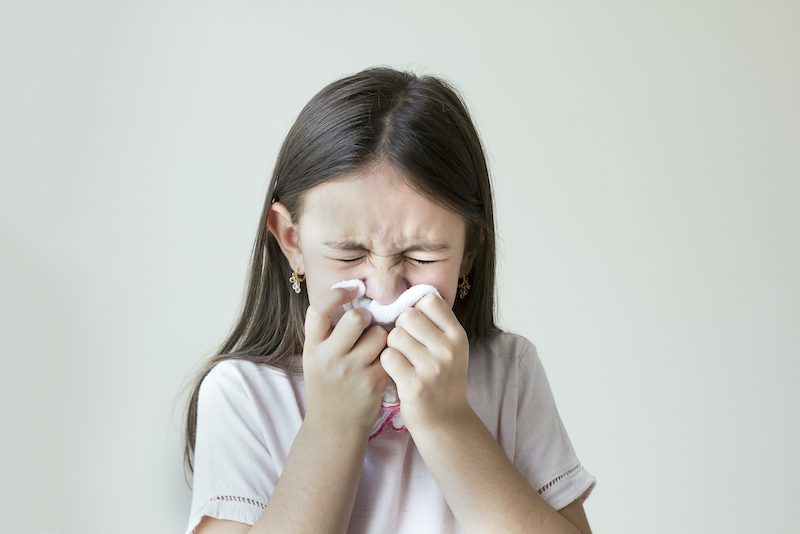With childhood allergies afflicting around 30% of children, many parents are left wondering what to do. If your child is wheezing, sniffling and coughing often, you may be curious about the cause and what you can do to help. We’ll run through many of the common questions that parents have about childhood allergies, so you can put your mind at ease.
What are the most common symptoms of allergies?
There are many common symptoms that children deal with when suffering from allergies. These symptoms can vary greatly depending on whether the allergy is environmental, a food allergy, a drug allergy or an insect sting allergy.
Environmental allergies, also known as allergic rhinitis, are the most common form of allergic reaction. Most commonly, children will be sneezing or coughing and will experience a runny nose and itchiness in the nose and roof of the mouth. It is also common to experience red, watery eyes. Symptoms are similar to but not the same as the common cold.
Symptoms for allergic rhinitis will usually be seasonal, although this isn’t always the case. If your child is experiencing allergy symptoms only during the spring and summer, allergic rhinitis is likely. However, you should see a board-certified allergist to confirm the root cause.
The most common culprits for environmental allergies in the Lowcountry are dust mites, cockroaches and mold. These often have a year-round impact on an allergic individual’s health.
Food allergies can cause a variety of symptoms, such as tingling or swelling in the mouth, hives, or even anaphylaxis in more severe cases. When food allergies are less severe, they can often be hard to diagnose, especially when the allergen is less common.
If your child ever experiences these symptoms, you should investigate as early as possible. Knowing the cause of a food allergy provides invaluable information so that you know how to best care for your child and eliminate risks of allergic reactions.
How are allergies in children treated?
There are three main ways that allergies can be treated: avoidance, medication and immunotherapy.
Avoidance
Avoidance simply means not coming in contact with the relevant irritant. This will help greatly, but can sometimes be hard to keep up. If your child wants to play outdoors during summer, but comes home with a runny nose or worse, it can be hard to find a balanced solution.
When symptoms are more severe, this can require children to miss school or be unable to see their friends. Finding a way to deal with allergy symptoms can greatly impact a child’s life well into the future, so make sure to deal with the issues head-on.
There is usually a comfortable middle ground to find if the allergies aren’t too severe. For example, dust-proofing your child’s bedroom or making sure to shower after coming indoors to remove any pollen spores can aid in the quick cessation of allergy symptoms.
One question we often get asked is, “Do I need to get rid of my pet if my child is allergic?” While pet allergies can be a nuisance to say the least, your board-certified allergist can provide recommendations on how to best avoid allergens within the home. We certainly won’t ask you to get rid of your pet! Our top recommendation for individuals with pet allergies is to receive immunotherapy, which has shown to be extremely beneficial in treating the cause of pet allergies.
Medications
Allergy symptoms can be further aided by using certain medications. Do not give your child any medications without first consulting your doctor or board-certified allergist. If you are told that a given medication doesn’t come with any risk, it may be worth a try.
Medications don’t make allergies go away permanently, but they help deal with symptoms and inflammation. Especially when symptoms get severe, medications can be the difference between a normal day at school and a day spent wheezing and unable to focus. Once you know a given medication is safe and effective, it can be good to have on hand in case your child’s symptoms flare up unexpectedly.
One thing to consider when finding the best medication treatment for allergies are common symptoms, such as drowsiness. It’s important to find the right medicine if that’s the treatment route you wish to take, and your allergist will always be able to recommend the best medication treatment plan for you or your child. If medication isn’t doing the trick, immunotherapy is the closest thing to a cure.
Immunotherapy
Lastly, most patients benefit greatly from immunotherapy. This is a long-term treatment option that involves injecting small doses of an allergen into the patient so that they build up immunity. Each patient receives an individualized treatment plan that is custom-tailored for your child’s specific allergens.
This option can have some difficulties when it comes to kids — it can be hard to drag them to the allergist each week! But, it is the best long-term solution and the only way to get truly permanent relief from allergies without using medications. Immunotherapy is available for a variety of allergies. It is also helpful to see a board-certified allergist who specializes in care and treatment for pediatric patients. Our allergists are double-boarded to treat both adults and pediatric patients. Oftentimes, they know how to make children feel right at home during their doctor’s visits and can make shot appointments far less scary or intimidating.
Key Things to Remember
As always, the best option to pursue if you suspect your child is suffering from allergies is to see a board-certified allergist. Through allergy testing and detailed health evaluations, this can provide you with an understanding of the best treatment path that is specific to your child’s situation, rather than just a guess.




